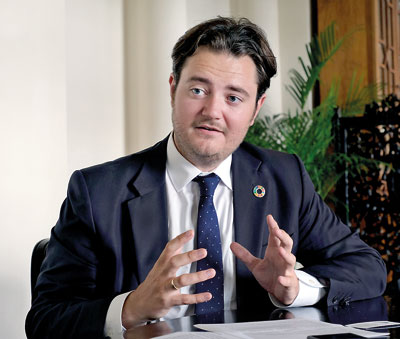News
Visiting Norwegian State Foreign Minister laments US withdrawal from UNHRC
Norway, while expressing concern and worry over last week’s “angry” withdrawal by the United States from the UN Human Rights Council, has reiterated its support for the Geneva-based organisation.

Norwegian State Foreign Minister Jens Frølich Holte. Pic by Amila Gamage
In an exclusive interview with the Sunday Times on Friday, visiting Norwegian State Foreign Minister Jens Frølich Holte described the UN HRC as an important tool for human rights. “We are worried that multilateral organisations like the council will be weakened by this move but Norway remains a strong supporter (of the council) and its engagement,” he said in response to the question.
The 33-year old minister (officially designated State Secretary for Foreign Affairs) met Sri Lanka’s Finance Minister and State Foreign Minister among others during his four-day visit coinciding with the Norwegian research vessel Dr. Fridtjof Nansen’s 26-day journey round Sri Lanka to map the country’s marine resources.
“Sri Lanka is a beautiful country and this is my first visit to this region. But most of the time, I was in meetings and closed rooms,” laughed the youthful and tall Norwegian who was appointed to the post last year.
A highly qualified individual with an MSc in Economic History from the London School of Economics and Political Science, Mr. Holte commented and responded on a range of issues like how plastic is destroying the global environment and marine resources, Norway’s continuous engagement in peace building across the world, education, corruption, the public’s free access to information and transparency. (A detailed version of the interview will be published next week.)
Two issues that would be of immediate interest to Sri Lanka are in “good neighbourly” relations in managing marine resources with other countries and stiff penalties including jail terms for killing protected animals. The issues are relevant in the context of Sri Lankan fishermen complaining of intrusion of Indian fishermen resulting in depleting fish stocks, and the brutal killing this week of a leopard by angry villagers in the north.
“We have a common fisheries management with our neighbours like Russia, for instance, in managing the seas,” he said in response to a question on Sri Lanka’s continuing dispute over Indian fishermen’s intrusion into Sri Lanka’s waters. “We have a good management of this resource and can fish for many years because of a long term plan based on ‘scientific’ recommendations”.
Continuing, he said that there were strict quotas for boats and limits on how much they fish. “We have managed our fish stock sustainably,” he said. Lessons for Sri Lanka since Norway is the world’s second largest seafood exporter and according to the Minister, it annually exports in the region of 60 billion Norwegian Kroners (over US$7 billion). In comparison, Sri Lanka’s seafood exports is miniscule: $240.6 million in 2017 (still 42 percent higher over 2016) out of the country’s total export of $11.4 billion.
Of interest to Sri Lankans, who were horrified by the brutal killing of a leopard last week is that environmental crimes (including killing of protected animals) is considered an economic crime. “There is a heated debate in Norway over the population (of wolves) which is a protected species. Recently illegal hunters caught by the police were sentenced to jail for killing wolves,” he said, adding that wild life crimes appeared to be a problem in this (Sri Lanka) region as well.
Similar to its peace-building efforts across the world (currently Costa Rica, Israel-Palestine and Colombia apart from Sri Lanka’s earlier peace process), Norway is actively engaging the world in the sustainable use of the oceans with its Prime Minister chairing a high level panel on this issue.
“We had a wake-up call in March 2017 when a dead whale washed ashore and we found 80 kg of plastic in its stomach. Last month, Thailand had a similar case of a whale dying after consuming plastic,” he said adding that Norway has budgeted $35 million for its marine anti-littering programme while also providing more than $12 million to a global fund in the World Bank to create marine waste infrastructure.

